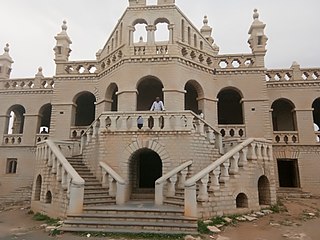
Nawab, also spelt Nawaab, Navaab, Navab, Nowab, Nabob, Nawaabshah, Nawabshah or Nobab, is a Royal title indicating a sovereign ruler, often of a South Asian state, in many ways comparable to the western titles of King. The relationship of a Nawab to the Emperor of India has been compared to that of the Kings of Saxony to the German Emperor. In earlier times the title was ratified and bestowed by the reigning Mughal emperor to semi-autonomous Muslim rulers of subdivisions or princely states in the Indian subcontinent loyal to the Mughal Empire i.e. Nawabs of Bengal. The title is common among Muslim rulers of South Asia as an equivalent to the title Maharaja.

Banganapalle or Banagana Palli is a town in the state of Andhra Pradesh, India. It lies in Kurnool district, 70 km south of the town of Kurnool. Banganapalle is famous for its mangoes and has a cultivar, Banganapalle, named after it. Between 1790 and 1948, Banganapalle was the capital of the princely state of the same name, Banganapalle State. Notable Persons who were born here is Pendekanti Venkatasubbaiah
A political pensioner enjoys a pension awarded due to his or political career or significance.
Nawab Faiz Ali Khan Bahadur, was a ruler of the princely state of Banganapalle, including the Chenchelimala territory.
Muhammad Ali Khan, popularly known as Nawab Muhammad Ali Khan Bahadur, was perhaps the most well known and reputed Nawab of Masulipatam in India. He was preceded by Qutb Ud Daula. The Nawabs of Masulipatam ruled under the Nizam in east India. The title was later known as Nawab of Banganapalle, as they family shifted from the region of Masulipatam to the territory of Banganapalle. Nawab Muhammad Ali Khan Bahadur belongs to the dynasty of Najm-i-Sani.
Daud Ali Khan Bahadur was Nawab of Masulipatam in India. He was son of Nawab Muhammad Ali Khan Bahadur.
The Nawabs of Masulipatam ruled under the Nizam in eastern India. The best known of them was Nawab Haji Hassan Khan.
Nawab Muhammad Taqi Khan Bahadur was Nawab of Masulipatam.
Nawab Ali Quli Mirza Bahadur was the ancestor of Nawabs of Banganapalle and Masulipatam. He belongs to The Najm-i-Sani Dynasty.
Muhammad Beg Khan-e Rosebahani was Qiladar and Jagirdar of Banganapalle. He was a supposed uncle of Imad ul-Mulk, Nawab Khwaja Muhammad Mubariz Khan Bahadur, Hizbar Jang, sometime Subadar of the Deccan and Wazir. In 1665, he was appointed as Qiladar of Banganapalle Fort and granted the surrounding districts in jagir by the Sultan of Bijapur. He died in 1686.

The Nawab of Banganapalle was the leader of Banganapalle, a fief of the Mughal empire which later became a princely state of British India, before being incorporated into Kurnool district of the Madras Presidency.
Nawab Fazl Ali Khan III Bahadur was Nawab of Banganapalle between 1758 and 1769. But his possessions was confirmed only in 1765.
Husain Ali Khan Bahadur was Nawab of Banganapalle between 1769 and 1783. He belonged to the Naqdi Dynasty.
Nawab Syed Ghulam Muhammad Ali Khan I Bahadur Mansur-Ud-Daullah was twice Nawab of Banganapalle in India.
Nawab Sayyid Husain Ali II Khan Bahadur abducted his father and succeeded him as Nawab of Banganapalle in 1822, a position he held for ten years until 1832.
Nawab Sayyid Asad Ali Khan Bahadur was Nawab of Chenchelimala between 1765 and 1791. He was son of Sayyid Muhammad Ali Khan Naqdi who was acted as Nawab of Banganapalle and Chenchelimala for Nawab Fazl Ali Khan III Bahadur.
The Najm-i-Sani dynasty was a Muslim dynasty of rulers in India. It is founded by Nawab Ali Quli Khan Bahadur, who was minister to Emperor Aurangzeb, and founder of the following lines:

The Turk Jamat are a Muslim community found in India. They claim they are descended from the various Turkic tribes that settled in the region. Many members of the community migrated to Pakistan after India's independence and subsequent partition, settling in Karachi.

Banganapalle State was one of the princely states of India during the period of the British Raj. The state was founded in 1665 and had its capital in Banganapalle. Its rulers were Shia Muslims and the last one signed the accession to the Indian Union on 23 February 1948.
Turkic peoples have historically been associated as one of the non-indigenous peoples to have ruled areas of the Indian subcontinent. Modern day Turkish people in India, on the other hand, are very small in number, and are recent immigrants from Turkey. In the 1961 census, 58 people stated that their mother tongue was Turkish. According to the 2001 census, 126 residents of India stated their place of birth as Turkey. In a state visit during early 2010, Prime Minister Abdullah Gül of Turkey met Turkish expatriates living in India and handed out Hindi-Turkish dictionaries to Turkish students in New Delhi.
This page is based on this
Wikipedia article Text is available under the
CC BY-SA 4.0 license; additional terms may apply.
Images, videos and audio are available under their respective licenses.




